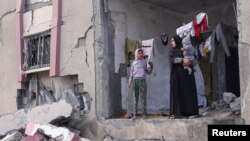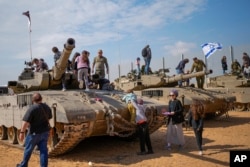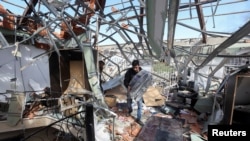Israel, Hamas and Qatari mediators on Tuesday all played down a suggestion by U.S. President Joe Biden that a new deal for a cease-fire and hostage release in the five-month Israel war with Hamas militants could be reached soon.
Hamas is considering a proposal, agreed to by Israel at talks with mediators in Paris last week, for a cease-fire that would suspend fighting for 40 days during Ramadan, the Muslim fasting month, which would be the first extended truce in the war.
Now, both sides have delegations in Qatar this week trying to work out details. But Qatari Foreign Ministry spokesman Majed al-Ansari said, "We don't have a final agreement on any of the issues that are hampering reaching an agreement. We remain hopeful that we can get to some kind of agreement."
One Hamas official told Reuters that there were "still big gaps to be bridged. The primary and main issues of the cease-fire and the withdrawal of Israeli forces are not clearly stated, which delays reaching an agreement."
Israel did not comment directly on Biden's optimism for a cease-fire, but government spokeswoman Tal Heinrich said any deal would still require Hamas to drop "outlandish demands, in another orbit, another planet."
"We are willing. But the question remains whether Hamas are willing," she said.
Israeli news website Ynet quoted unidentified senior Israeli officials as saying they did not understand "what [Biden's] optimism is based on."
Biden said Monday that he hoped there would be a cease-fire by March 4, later telling comedian Seth Meyers on his late-night NBC show, "Ramadan is coming up [March 10], and there's been an agreement by the Israelis that they would not engage in activities during Ramadan, as well, in order to give us time to get all the [100 or so] hostages out."
According to one source close to the talks, the Paris proposal would see Hamas free some but not all of the hostages they are holding, in return for the release of hundreds of Palestinians jailed by Israel, a surge in humanitarian aid for famished Palestinians in Gaza and Israeli troops pulling out of populated areas in the enclave along the Mediterranean Sea coastline.
But the deal apparently does not cover Hamas' main demand for a permanent end to the war and an Israeli troop withdrawal. Nor does it resolve the fate of fighting-age Israeli men among the hostages.
Israeli Prime Minister Benjamin Netanyahu said in recent days that a temporary cease-fire would not change Israel's plans to eventually carry out an offensive in the southern town of Rafah to achieve Israel's goal of eliminating Hamas.
Prospects of a Rafah operation have raised international alarms because of the large number of Palestinians who are living there, many of them after fleeing other parts of Gaza in search of safety.
"Israel has slowed down the attacks in Rafah," Biden said on the "Late Night with Seth Meyers" show. "They have to, and they have made a commitment to me that they're going to see to it that there's an ability to evacuate significant portions of Rafah before they go and take out the remainder of Hamas."
Netanyahu's office said Monday the Israeli military gave his war Cabinet "a plan for evacuating the population from the areas of fighting in the Gaza Strip, and with the upcoming operational plan."
But the Netanyahu statement did not give any details about where Israel plans to send the Palestinians, and Egypt has said it will not open its borders. Much of Gaza has been leveled during Israel's massive counteroffensive after the October 7 Hamas terror attack killed 1,200 people in Israel.
Nearly 30,000 Palestinians have been killed in Gaza, the majority women and children, according to the Hamas-run Gaza health ministry. Israel's campaign has also injured more than 70,200 people. Israel says it has killed 12,000 Hamas fighters.
The United Nations has expressed concern about any plan to move the civilian population from southern Gaza and about Israeli plans to launch an offensive in the area populated by people already in need of humanitarian aid.
Hamas captured about 250 hostages in its October attack. About 100 hostages were released during a weeklong cease-fire in November. The Israeli military says it believes about 30 hostages held by Hamas have subsequently died or been killed in Gaza.
Hezbollah conflict
Israel's military reported Tuesday a second consecutive day of airstrikes in Lebanon targeting the militant group Hezbollah, which is a Hamas ally.
Tuesday's strikes came in response to a barrage of Hezbollah rocket fire aimed at a military base in northern Israel, which the Israeli military said caused no damage.
Hezbollah shot down an Israeli drone Monday, leading to Israeli airstrikes near the Lebanese city of Baalbek, with Hezbollah saying two people were killed.
Months of cross-border fighting between Israel and Hezbollah has raised concerns about the conflict spreading throughout the Middle East.
Hospital evacuation
The United Nations said Tuesday that a joint effort with the Palestine Red Crescent Society (PRCS) to evacuate patients from the Al Amal hospital in Khan Younis was held up by Israeli forces.
The U.N. humanitarian office said in a statement that the convoy was stopped for seven hours just after leaving the hospital on Sunday, despite prior coordination with Israel that involved sharing personal details of all the staff members and vehicles involved.
The statement said three paramedics from the PRCS were detained, and that two were still being held.
"This is not an isolated incident. Aid convoys have come under fire and are systematically denied access to people in need. Humanitarian workers have been harassed, intimidated or detained by Israeli forces, and humanitarian infrastructure has been hit," the U.N. humanitarian office said.
Some information for this report came from The Associated Press, Agence France-Presse and Reuters.







